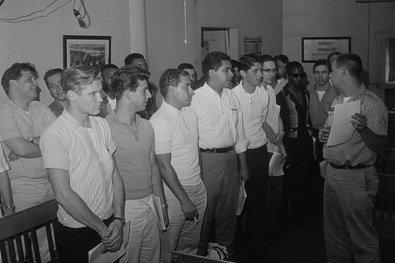
Military Service Matters Less to Most Americans
Donald Trump received five draft deferments during Vietnam, including one for a diagnosis of bone spurs in his heels. While there have been United States presidents who avoided the draft, it is an issue that continues to come up during presidential campaigns in which baby boomers are candidates. But does a politician’s draft record really matter?
* draft deferment = 징병 연기/ diagnosis = 진단/ bone spur = 골극/ come up = 언급[논의]되다/ presidential campaign = 대선 운동
 정치인의 병역 기록이 정말로 중요한가요?
정치인의 병역 기록이 정말로 중요한가요?
1. Strong Leaders Don’t Hide From Military Service
I don't see how a president who dodged the draft can in good conscience call on others, like me, to risk my life for his policies.
2. Military Service Matters Less to Most Americans
As our military evolves so should our ideas about who should carry the burden of our nation’s defense.
3. Motives Matter
Principled opposition to a war can even be a positive credential. Avoiding service out of self-interest deserves contempt.
Sample Essay
Military Service Matters Less to Most Americans
Despite the fact that it’s unlikely any Vietnam veteran will ever be elected president of the United States, charges of “draft dodging” still plague a generation of politicians. We should stop pretending as though military service matters so much for our elected officials.
Some partisans have questioned the sacrifices of two recent presidential candidates who were decorated combat veterans of Vietnam, John Kerry and John McCain. As a veteran, I’m left speechless in the wake of such criticism.
On both sides of my family there’s a long line of military service, dating back four generations. I joined the Navy in 2001, motivated in part by the events of 9/11, deploying to Kandahar, Afghanistan. Eventually, rather than take orders to Iraq, I chose to leave the military to attend college.
For years, when I placed my own service in context with those who never made it home, especially after two of my friends were killed in Afghanistan, I struggled with my decision to leave the Navy. The reasons people join and then leave the military during wartime are numerous and personal.
In the political arena, tiresome debates about military service and deferments are nothing more than partisan rhetoric that wrongly focuses on those who might have dodged a war that took place almost 50 years ago, while overlooking the fact that the vast majority of people have opted out of our most recent ones.
Since the end of Vietnam, the military has become far more professionalized and modernized. As our military evolves so should our ideas about who should carry the burden of our nation’s defense.
Veterans are being elected to every level of public office, and I look forward to the day when a combat-tested man or woman is once again in the Oval Office. But that desire, to have someone with a military background as my president, has less to do with how the military prepares people for politics and far more to do with how service, of any kind, compliments what are the true strengths of our nation’s best elected leaders: selflessness, compassion, collaboration, thoughtfulness and empathy.





![]() 정치인의 병역 기록이 정말로 중요한가요?
정치인의 병역 기록이 정말로 중요한가요?






